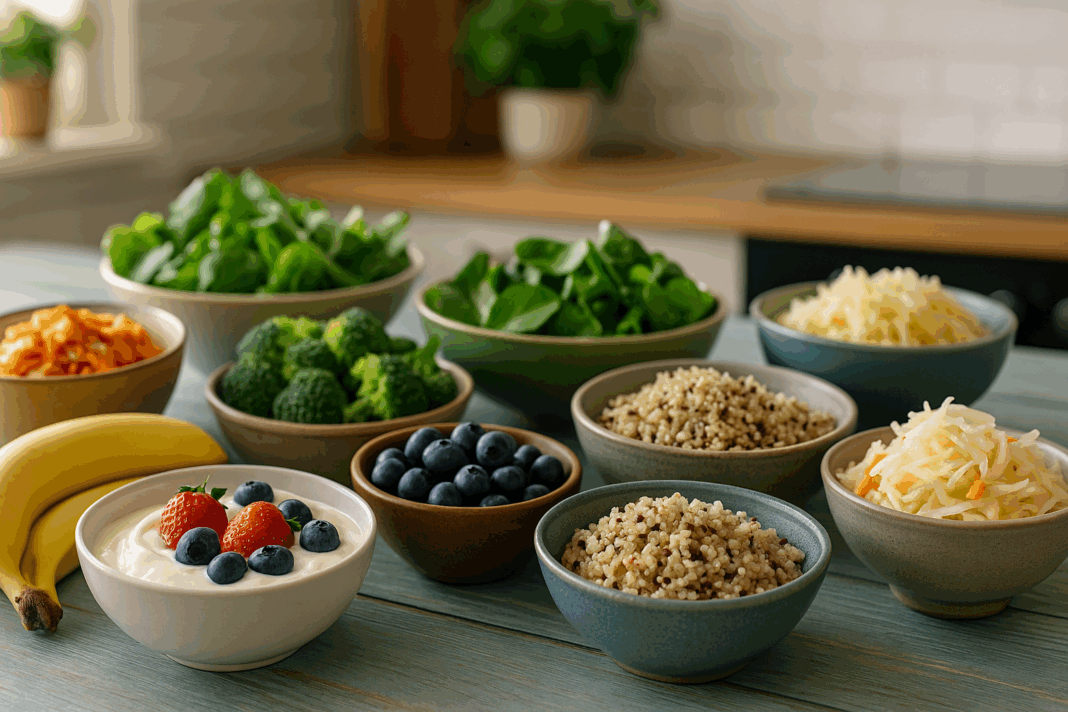Introduction: Unlocking the Power of Gut Healthy Meals
Understanding the importance of gut health has become a cornerstone of modern holistic wellness, and gut healthy meals play a pivotal role in nurturing a thriving digestive system. In recent years, scientific discoveries have illuminated the profound impact that the gut microbiome has on nearly every facet of human health, from digestion and immunity to mood and cognition. A thoughtfully curated diet filled with gut healthy meals provides the essential nutrients, prebiotics, and probiotics needed to foster a balanced microbial environment. This guide explores the transformative power of gut healthy recipes, providing college graduates and health-conscious readers with in-depth knowledge, practical strategies, and delicious ideas to seamlessly integrate the best meals for gut health into daily life.
You may also like: How to Increase Stamina and Endurance Naturally: Smart Training Tips and Nutrition Habits That Support Cardiovascular Fitness
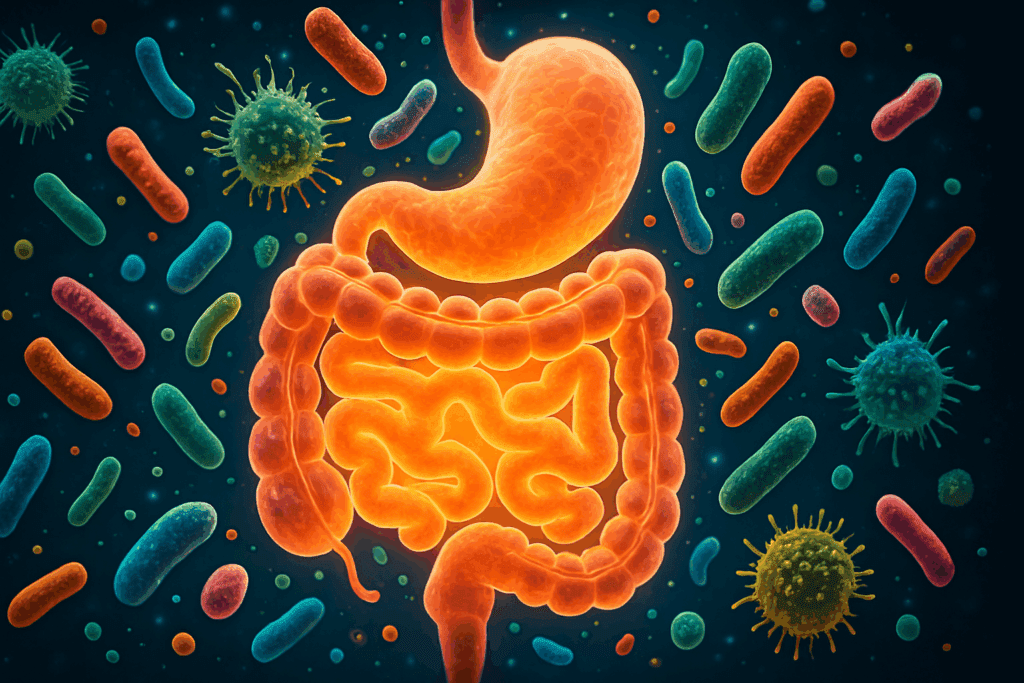
Why Gut Health Matters More Than Ever
The significance of gut health extends far beyond the mere absence of gastrointestinal discomfort. A robust gut ecosystem serves as the body’s command center for immunity, with approximately 70% of the immune system housed within the intestinal walls. The gut also acts as an emotional barometer, influencing mental wellness through the gut-brain axis. An imbalance in gut bacteria, known as dysbiosis, has been linked to a myriad of conditions including inflammatory bowel disease, autoimmune disorders, metabolic syndrome, and even depression. Thus, the pursuit of gut healthy meals is not merely a dietary trend but a scientifically validated strategy to bolster holistic health.
Equally compelling is the role of the gut in nutrient absorption. Without optimal gut function, even the most nutrient-rich diets can fail to deliver their intended benefits. Fiber-rich foods, fermented delicacies, and polyphenol-laden ingredients collectively shape a diet that nourishes not just the body, but the symbiotic bacterial communities that live within it. Choosing gut healthy recipes designed to support microbial diversity ensures the body receives maximal nutritional advantages.
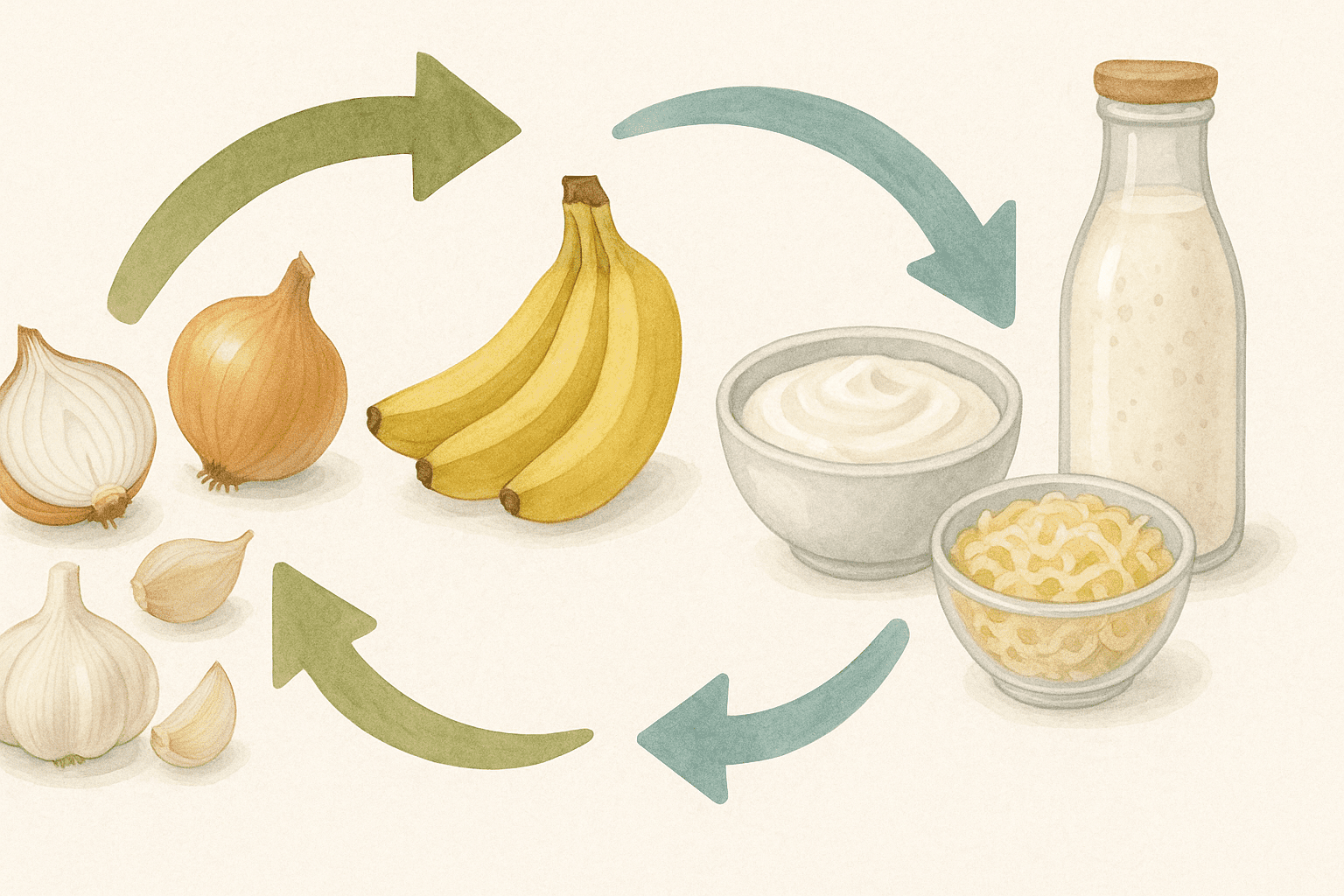
The Science Behind Gut Healthy Meals
At the heart of gut healthy meals lies a strategic combination of prebiotic and probiotic components. Prebiotics are non-digestible fibers that serve as food for beneficial gut bacteria, encouraging their proliferation. Sources such as garlic, onions, leeks, asparagus, and bananas are potent in prebiotic fibers. Meanwhile, probiotics are live microorganisms that directly contribute to a healthier gut flora. Yogurt with live cultures, kefir, sauerkraut, kimchi, and miso are excellent examples of probiotic-rich foods.
Recent research underscores the importance of consuming a wide variety of fiber types to promote microbial richness. Soluble fibers, found in oats and legumes, blend with water to form a gel-like substance that regulates blood sugar and cholesterol. Insoluble fibers, prevalent in whole grains and vegetables, add bulk to the stool and aid in regularity. Balancing these fiber sources through well-designed gut healthy recipes enhances gastrointestinal resilience and fosters a hospitable environment for beneficial microbes.
Moreover, gut healthy meals often feature polyphenols — naturally occurring compounds found in colorful fruits and vegetables — which exhibit antioxidant properties and modulate microbial populations. Blueberries, green tea, and dark chocolate are prime examples of polyphenol-rich foods that can invigorate the gut ecosystem. By understanding the scientific rationale behind ingredient selection, one can curate meals that actively contribute to gut health while delighting the palate.
Building a Foundation: Core Elements of Gut Healthy Meals
Crafting gut healthy meals begins with intentional ingredient choices grounded in both flavor and function. Incorporating a rainbow of fruits and vegetables ensures a diverse intake of phytonutrients, fostering microbial diversity. Leafy greens like spinach and kale, cruciferous vegetables such as broccoli and Brussels sprouts, and root vegetables including carrots and sweet potatoes, all serve as vital building blocks.
Whole grains, particularly those rich in resistant starch like oats, barley, and quinoa, further contribute to a resilient gut lining. Resistant starch bypasses digestion in the small intestine and ferments in the colon, producing beneficial short-chain fatty acids that nourish colon cells. Legumes such as lentils, chickpeas, and black beans also offer a robust blend of fiber, protein, and prebiotics, making them integral to gut healthy recipes.
Fermented foods hold a special place within gut health recipes, as they provide direct doses of beneficial bacteria. However, it is essential to choose traditionally fermented varieties without added sugars or pasteurization, as these processes can diminish probiotic content. Complementing meals with naturally fermented foods creates a synergistic effect that amplifies gut health benefits.
Hydration, often overlooked, is another cornerstone. Adequate water intake facilitates the passage of fiber through the digestive tract and supports mucosal lining integrity. Herbal teas, bone broths, and infused waters can enhance hydration while delivering additional gut-supportive nutrients.
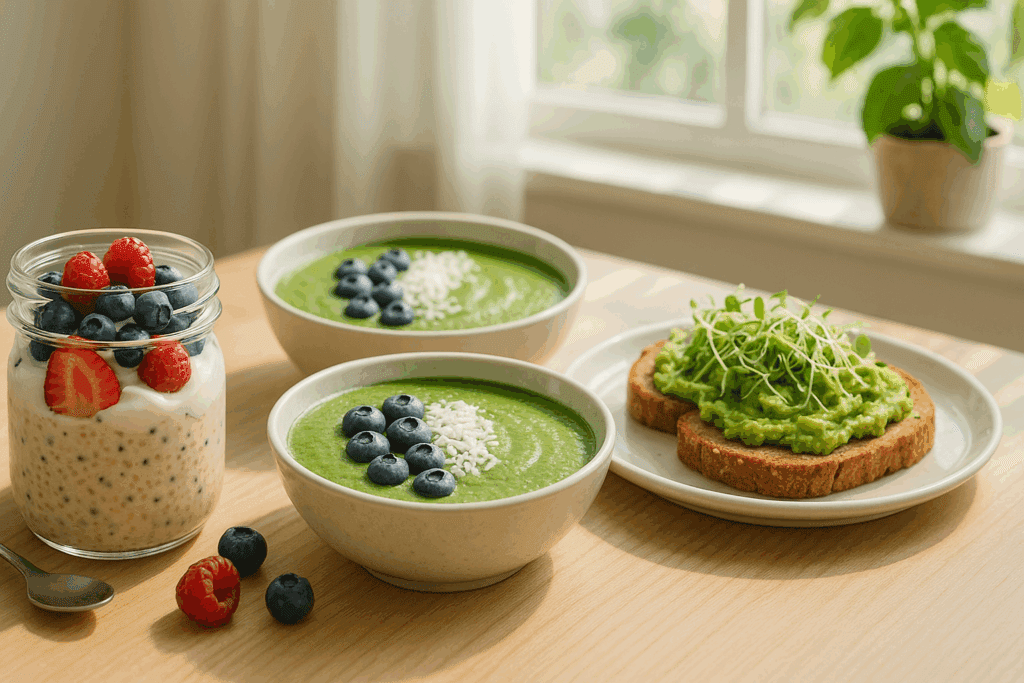
Gut Healthy Meals for Breakfast: A Vital Start
Breakfast presents a prime opportunity to lay the foundation for gut health each day. A well-constructed morning meal balances fiber, probiotics, and anti-inflammatory compounds. One exemplary choice is overnight oats made with chia seeds, flaxseeds, and almond milk, topped with berries and a dollop of yogurt. This combination provides soluble fiber, omega-3 fatty acids, and live cultures in a single bowl.
Smoothie bowls crafted from spinach, kefir, and antioxidant-rich fruits offer another gut health recipe brimming with potential. Adding a spoonful of prebiotic fiber powder or a handful of oats ensures microbial nourishment. For savory palates, avocado toast on whole-grain bread sprinkled with hemp seeds and accompanied by a side of fermented vegetables supplies healthy fats, fiber, and probiotics.
Egg-based dishes can also be adapted for gut health by incorporating sautéed greens, onions, and mushrooms. The inclusion of polyphenol-rich vegetables and resistant starch sources elevates a simple scramble into a gut nourishing powerhouse. No matter the preference, starting the day with gut healthy meals sets a positive trajectory for digestive balance.
Delicious Gut Healthy Recipes for Lunch
Midday meals provide a critical opportunity to refuel the microbiome after a busy morning. Incorporating best meals for gut health at lunch ensures sustained energy, mental clarity, and digestive comfort. Grain bowls composed of quinoa, roasted vegetables, and a miso-tahini dressing exemplify a nutrient-dense, gut friendly option.
Salads made with diverse greens, fermented pickles, pumpkin seeds, and chickpeas combine fiber, probiotics, and prebiotics seamlessly. Incorporating a piece of grilled salmon or sardines enhances the omega-3 content, which supports anti-inflammatory pathways in the gut lining. The addition of colorful toppings such as pomegranate seeds, radishes, and shredded carrots introduces a spectrum of antioxidants crucial for microbial vitality.
Soups, too, offer a versatile platform for gut healthy recipes. A lentil and vegetable stew seasoned with turmeric and black pepper not only satisfies hunger but delivers fiber, resistant starch, and anti-inflammatory compounds. Broths enriched with miso, seaweed, and tofu create an umami-rich, probiotic-boosting lunch.
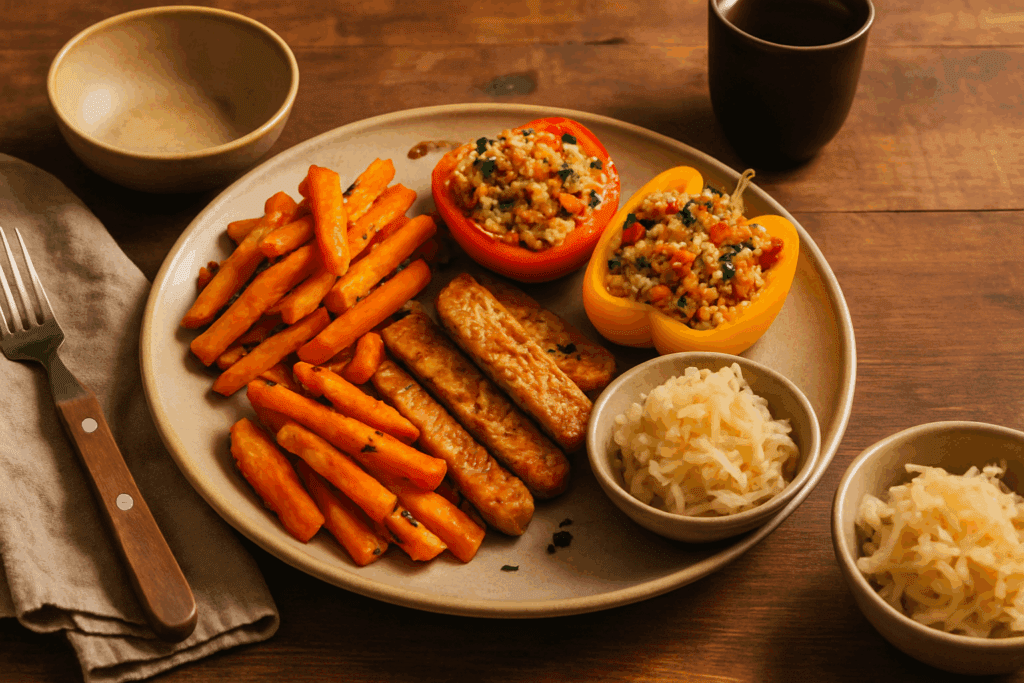
Satisfying Dinners: Best Meals for Gut Health at Night
Evening meals should prioritize gentle digestion and microbial nourishment. Roasted root vegetables paired with grilled tempeh and a side of fermented sauerkraut create a hearty, balanced plate. Including a serving of fermented food at dinner supports overnight microbial activity, fostering better digestion and nutrient absorption.
Stuffed bell peppers filled with brown rice, lentils, and herbs present another gut health recipe that is both satisfying and fiber-rich. The natural sweetness of roasted vegetables complements the earthiness of legumes, providing a symphony of flavors while nurturing beneficial bacteria.
For those craving pasta, choosing lentil or chickpea-based noodles tossed with a rainbow of roasted vegetables and a sprinkle of nutritional yeast delivers gut friendly benefits without compromising taste. The use of resistant starch-containing pasta alternatives and fiber-dense additions ensures the meal supports gut health while feeling indulgent.
Creative Snacks and Treats That Boost Gut Health
Snacking can be a strategic opportunity to bolster gut health between meals. Roasted chickpeas seasoned with cumin and paprika offer a crunchy, fiber-rich alternative to processed snacks. Yogurt parfaits layered with granola, chia seeds, and fresh fruit provide a balanced mix of probiotics, prebiotics, and antioxidants.
Homemade energy bites made from oats, almond butter, flaxseeds, and a touch of honey deliver sustained energy while supporting digestive wellness. Fermented foods can also be enjoyed as snacks; a few bites of kimchi, a small serving of sauerkraut, or a probiotic drink shot between meals contribute beneficial microbes without overwhelming the digestive system.
Dark chocolate with at least 70% cacao content, enjoyed in moderation, can serve as a delightful treat rich in polyphenols that support microbial diversity. Choosing quality ingredients and mindful preparation ensures that every snack becomes an opportunity to nourish the gut.
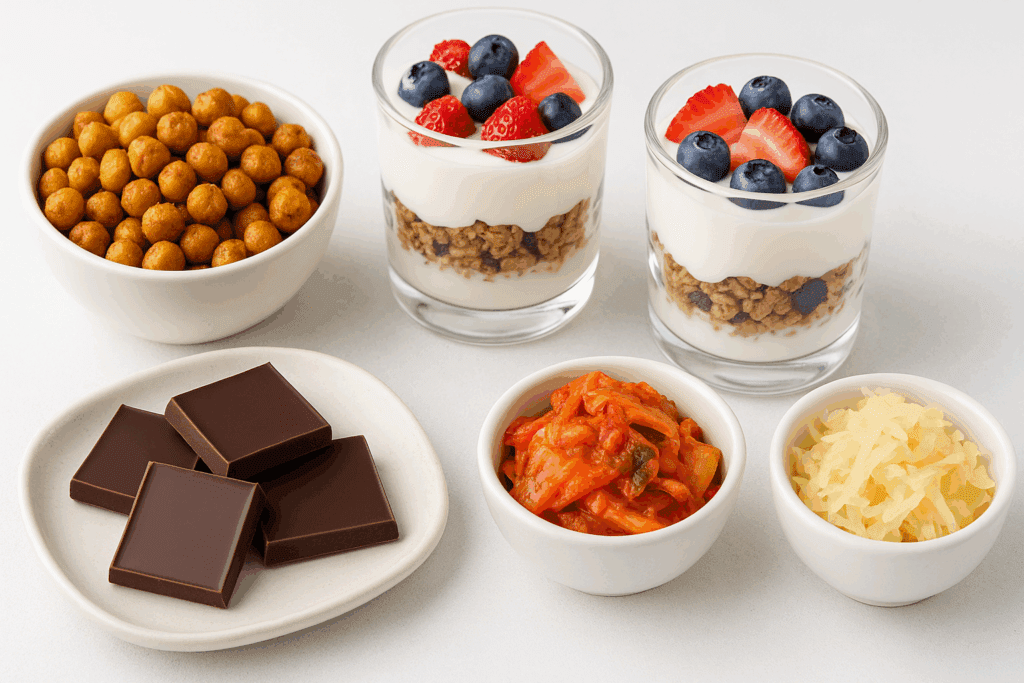
Gut Healthy Recipes: Easy Meal Planning Tips
Sustaining a gut healthy diet requires intentional planning, but it need not be complicated. Beginning the week by preparing staples such as cooked grains, roasted vegetables, and fermented side dishes ensures that assembling gut healthy meals becomes a swift, satisfying process.
Batch-cooking soups, stews, and grain bowls allows for easy lunches and dinners throughout the week. Keeping a variety of fresh herbs, lemon, and high-quality olive oil on hand enables flavor enhancement without relying on processed sauces.
Diversifying meal components is key. Rotating different types of greens, grains, legumes, and fermented foods prevents microbial monotony and maximizes health benefits. Embracing global culinary traditions, from Mediterranean mezze to Korean bibimbap, broadens ingredient exposure while making gut healthy meals exciting and accessible.
Best Meals for Gut Health: Ingredients to Prioritize
Certain ingredients stand out as superstars in gut health recipes. Jerusalem artichokes, dandelion greens, and chicory root are among the most potent natural sources of inulin, a powerful prebiotic fiber. Including these less common vegetables adds both novelty and nutritional depth.
Fermented soy products like tempeh and natto provide probiotics along with complete proteins, making them ideal components of plant-based gut healthy meals. Resistant starch from cooked and cooled potatoes, green bananas, and legumes offers a simple yet potent way to nurture beneficial bacteria.
Additionally, herbs and spices such as ginger, turmeric, garlic, and cinnamon not only enhance flavor but also possess antimicrobial and anti-inflammatory properties that support gut integrity. Mindfully incorporating these ingredients into daily meals fortifies the gut while invigorating the senses.
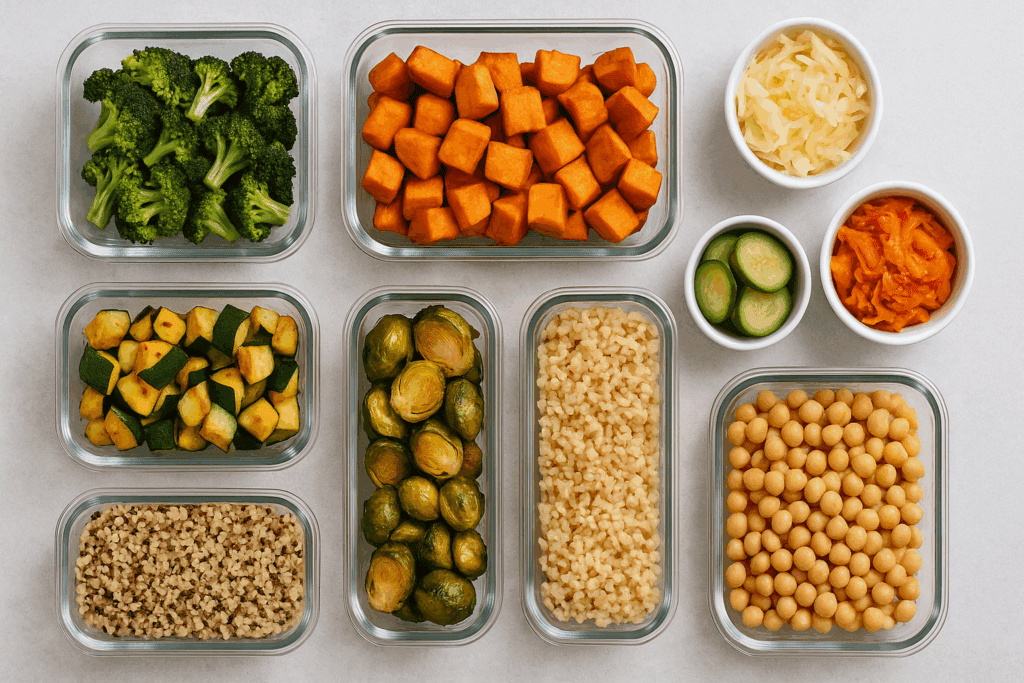
Overcoming Common Challenges to Gut Healthy Eating
Adopting a gut-focused diet can present hurdles, particularly for individuals with digestive sensitivities or busy lifestyles. Gradually increasing fiber intake over several weeks prevents discomfort and allows the microbiome to adjust. Choosing cooked vegetables over raw, particularly in the early stages, eases digestion.
Time constraints can be mitigated by preparing freezer-friendly gut healthy recipes such as soups, casseroles, and smoothie packs. Dining out also need not derail gut health; selecting menu items rich in vegetables, whole grains, and fermented components ensures continued microbial support.
Lastly, individual variability must be respected. Food sensitivities, such as to FODMAPs, require tailored approaches. Consulting with a registered dietitian specializing in gut health can facilitate personalized meal planning that aligns with individual needs while maintaining gut health objectives.
Frequently Asked Questions About Gut Healthy Meals: Expert Insights for Better Digestive Wellness
How can gut healthy meals improve mental health over time?
Gut healthy meals not only nourish the digestive tract but also profoundly impact the gut-brain axis, which plays a pivotal role in regulating mood and cognitive function. Over time, diets rich in gut healthy recipes can help reduce systemic inflammation, which is often linked to anxiety and depression. Studies have shown that certain probiotic strains found in foods like kefir and sauerkraut can promote neurotransmitter production, including serotonin, often referred to as the “feel-good” hormone. Furthermore, a diverse gut microbiota supported by the best meals for gut health enhances resilience to stress and fosters emotional balance. Committing to gut healthy meals consistently can thus contribute to long-term psychological wellness and emotional stability.
What are some unexpected ingredients that can make gut health recipes even more effective?
While many gut health recipes emphasize familiar ingredients like yogurt and oats, unexpected foods like artichokes, seaweed, and fermented black garlic can supercharge gut health. Artichokes, for instance, are rich in inulin, a powerful prebiotic fiber that selectively feeds beneficial bacteria. Seaweed introduces unique polysaccharides that enhance microbial diversity, an essential factor for resilient digestion. Fermented black garlic provides both probiotics and antioxidants, offering a dual-action benefit for gut integrity. Incorporating these lesser-known ingredients into gut healthy meals not only adds intriguing flavors but also elevates their functional impact.
Can gut healthy meals help with food intolerances?
Yes, thoughtfully designed gut healthy meals can sometimes assist in reducing symptoms associated with food intolerances, although they are not a direct cure. Improving the gut barrier function through regular intake of prebiotics and probiotics can decrease intestinal permeability, commonly referred to as “leaky gut.” This, in turn, may lessen the immune system’s overreaction to certain food particles. Gradually reintroducing previously problematic foods while maintaining a robust gut health recipe foundation can sometimes expand dietary tolerance. However, it is crucial to work with a healthcare professional when managing serious intolerances to avoid adverse reactions.
How do gut healthy recipes influence immune system strength?
A well-balanced gut microbiome acts as the body’s first line of defense against pathogens. Consuming gut healthy recipes rich in fermented foods, fiber, and polyphenols helps to reinforce this microbial shield. Beneficial bacteria compete with harmful invaders for resources, produce antimicrobial compounds, and modulate immune cell activity. Over time, eating the best meals for gut health can reduce chronic inflammation and promote a more responsive, less hyperactive immune system. In a world where immune resilience is more important than ever, gut healthy meals provide a proactive, everyday strategy for defense.
What is the best way to transition to gut healthy meals without shocking the digestive system?
Transitioning to a diet based heavily on gut healthy meals should be a gradual and mindful process. Suddenly increasing fiber and fermented foods can cause temporary bloating and discomfort if the gut microbiota isn’t accustomed to such a rich diet. It is best to introduce gut health recipes incrementally, starting with small servings of fermented foods and steadily increasing fiber over several weeks. Staying hydrated and including easily digestible foods like cooked vegetables early on can also ease the adjustment. Listening to your body’s responses and making adjustments as needed ensures a smooth, sustainable transition.
Are gut healthy meals suitable for individuals following a plant-based diet?
Absolutely, gut healthy meals are exceptionally compatible with plant-based diets and, in fact, often thrive on them. Many gut health recipes naturally incorporate a wide range of fruits, vegetables, legumes, nuts, and seeds — all of which provide abundant prebiotic fibers. Plant-based fermented foods like tempeh, miso, and kimchi can deliver probiotics without relying on animal products. Whole grains and resistant starch sources such as lentils and quinoa further enrich the best meals for gut health. With thoughtful planning, a plant-based diet can support exceptional gut microbiome diversity and resilience.
Gut Healthy Meals for Busy Lifestyles: How to Make It Work
Maintaining gut healthy meals while juggling a busy schedule requires strategic planning and efficiency. Meal prepping one or two large-batch gut health recipes on weekends can provide a foundation for quick, nourishing meals during the week. Keeping staples like precooked grains, fermented vegetables, and prewashed greens on hand ensures that assembling meals takes minutes, not hours. Portable options like yogurt parfaits, hummus with veggies, and fermented drink shots make it easier to nourish your gut even on the go. Choosing restaurants that offer gut-friendly dishes like grain bowls or salads with fermented toppings also helps maintain consistency. With a little forethought, gut healthy meals can become a seamless part of even the most hectic lifestyles.
How can children benefit from gut healthy recipes early in life?
Introducing children to gut healthy recipes early in life can set the stage for a lifetime of robust digestive and immune health. The early years are critical for establishing a diverse gut microbiome, which influences everything from allergy development to metabolic function later in life. Offering naturally fermented foods, colorful vegetables, and fiber-rich fruits in child-friendly forms encourages acceptance and builds healthy habits. Even picky eaters can benefit by incorporating prebiotic-rich foods like bananas and oats into smoothies and snacks. Making gut healthy meals a family norm not only supports immediate wellness but may also offer protective benefits for decades to come.
Best Meals for Gut Health During Seasonal Changes: Tips and Strategies
Seasonal transitions can strain the digestive system, but gut healthy meals provide essential support during these times. In colder months, warming dishes like lentil stews and fermented miso soups help maintain digestive balance and internal warmth. Spring and summer invite lighter gut health recipes featuring crisp vegetables, fresh herbs, and hydrating fermented beverages like kombucha. Seasonal eating also introduces a natural variety of produce, fostering microbial diversity. Adapting gut healthy meals to reflect seasonal shifts ensures that the gut receives the changing nutrients it needs throughout the year for optimal performance.
Can personalized gut healthy recipes optimize individual microbiomes?
Emerging research suggests that personalized gut healthy recipes tailored to an individual’s unique microbiome could represent the future of digestive wellness. Gut microbiome testing can reveal specific bacterial imbalances or deficiencies, enabling the design of targeted dietary interventions. For instance, a person with low levels of bifidobacteria might benefit from increased consumption of inulin-rich foods like asparagus and onions. Conversely, someone experiencing inflammation might prioritize polyphenol-dense foods like berries and green tea. Personalizing gut healthy meals based on individual microbial needs could unlock even greater health benefits than a one-size-fits-all approach.
Conclusion: Embracing the Transformative Power of Gut Healthy Meals
Incorporating gut healthy meals into everyday life represents a transformative commitment to holistic well-being. Through intentional ingredient selection, creative culinary techniques, and a dedication to nurturing the gut microbiome, individuals can unlock profound health benefits. From improved digestion and enhanced immunity to greater mental clarity and emotional resilience, the rewards of embracing gut health are manifold.
By integrating a rich array of gut healthy recipes into daily routines, the journey toward optimal health becomes not only attainable but also deeply enjoyable. In a world increasingly recognizing the central role of the gut in overall wellness, prioritizing the best meals for gut health is a vital, empowering step toward a vibrant, resilient life.
May this ultimate guide inspire a delicious, nourishing adventure that honors the intricate symphony within — one gut healthy meal at a time.
Further Reading:
17 Gut-Healthy Dinners You Can Make in 30 Minutes or Less

